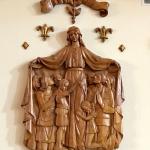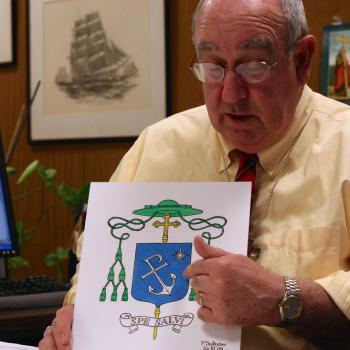A priest posed that question to a friend several weeks ago, at the start of the Easter season. My friend wasn’t sure, so he asked me.
I said, “Sure. I do it every year.” The celebrant does the initial sprinkling, and I then fan out into the congregation with him or other priests to spread holy water throughout the church.
Some background, from Pray Tell:
The Roman Missal allows for the substitution of the sprinkling rite for the Penitential Act on Sundays throughout the year, but especially at Easter, as a reminder of baptism. The sprinkling rite is a wonderful way to reinforce the initiatory quality of Easter, and serves to tie the dying and raising of the faithful in the waters of baptism to the dying and rising of Christ celebrated during Holy Week. But Easter is not the only time that the sprinkling rite can be used. Contrary to the popular desert motif of Lent, Lent’s two-fold baptismal and penitential emphasis makes it an appropriate time for the occasional usage of the sprinkling rite, especially at the scrutinies. Other times throughout the year also lend themselves to the sprinkling rite. The rite specifically provides for the blessing of the water in front of the people so as to solidify its baptismal symbolism.
In my experience, the rite is usually used during the octave of Easter (the beginning of the season) and at Pentecost (the end.) And as you can see in the CNS video below from Rome on Sunday, deacons were involved.
UPDATE: There’s been some lively discussion on Facebook regarding this issue. Here’s a more cogent explanation than mine, with the appropriate citations, from Father Edward McNamara:
What commentaries I have found say this: “Asperges is the older name for the Rite for the Blessing and Sprinkling of Water, now an option at the beginning of Sunday Mass, replacing the Penitential Act” (Driscoll and Joncas, “Order of Mass,“ 2011). And this:
“This rite is not a penitential act like the pre-Vatican II Asperges; rather, it is a joyful memorial of the baptism that gives admission to the eucharistic banquet…. If the assembly is sufficiently large or spread out to warrant it, the deacon might also sprinkle them (although the rubrics are silent about this)” (Kwatera, “Liturgical Ministry of Deacons,“ 2005).
Our reader then adds:
“This last quote raises the issue that is the subject of my question.
“I looked for analogous situations. In the third form of the Penitential Act, while the priest gives the introduction and the absolution, the invocations themselves are said by the priest, deacon, ‘or another minister’ (Roman Missal, Order of Mass, 6.). This would seem to be a close analogue to a deacon or another minister sprinkling water between the priest’s introductory and closing prayer, even if the sprinkling rite is a form of the Penitential Act.
“In the blessing and distribution of ashes on Ash Wednesday as well, there seems to be a similar situation. The Roman Missal says that on that day, ‘The Penitential Act is omitted, and the Distribution of Ashes takes its place.’ In this clear replacement for the Penitential Act, the Book of Blessings (U.S. adaptation), No. 1659, says: ‘This rite may be celebrated by a priest or deacon who may be assisted by lay ministers in the distribution of the ashes. The blessing of the ashes, however, is reserved to a priest or deacon.’ Again, the prayers are not in question, only the distribution of ashes, or, in the case of the sprinkling rite, the aspersion of holy water.
“My own conclusion is that in the sprinkling rite, even if it is a form of the Penitential Act, the sprinkling itself can be done by someone other than the priest celebrant, who in any case would say the opening and closing prayers.”
…As providence would have it, I had the privilege of being among the priest concelebrants at Pope Francis’ Mass of Pentecost on May 15 in St. Peter’s Basilica. This Mass began with the rite of sprinkling. At the moment of the sprinkling, the Holy Father remained at the chair and sprinkled those immediately around him and, somewhat symbolically, the concelebrants who were at a certain distance. Meanwhile, however, several deacons processed down the aisles of the basilica sprinkling the people.
While the practice of papal Masses cannot always be extended to other situations, I think that this practice at least makes it clear that deacons can assist in the sprinkling if there is sufficient reason for doing so. It must be remembered that deacons in the ordinary form can now perform many blessings which were previously reserved to the priest alone. In many Eastern Churches deacons may not impart any blessings whatsoever.
I do not think that the deacon could replace the priest entirely. If a priest is infirm and has difficulty moving, he can sprinkle from the chair, and then the deacon or another priest could walk down the aisles to sprinkle the people.
Naturally, as often happens on social media, this led to a discussion about other things — notably, Benediction. A priest stated that a deacon can only give Benediction in the absence of a priest. Otherwise, a priest is to do it.
Not true.
From the Sacred Congregation of Divine Worship:
91. The ordinary minister for exposition of the eucharist is a priest or deacon. At the end of the period of adoration, before the reposition, he blesses the congregation with the sacrament.
In the absence of a priest or deacon or if they are lawfully impeded, the following persons may publicly expose and later repose the eucharist for the adoration of the faithful:
a. an acolyte or special minister of communion;
b. upon appointment by the local Ordinary, a member of a religious community or of a pious association of laymen or laywomen which is devoted to eucharistic adoration.
Such ministers may open the tabernacle and also, as required, place the ciborium on the altar or place the host in the monstrance. At the end of the period of adoration, they replace the blessed sacrament in the tabernacle. It is not lawful, however, for them to give the blessing with the sacrament.












